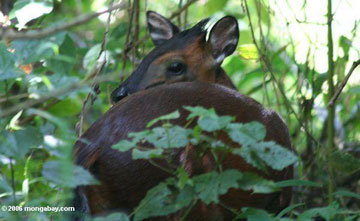Human hunting pressure causes significant behavioral changes in Central Africa monkeys and duiker according to a paper published in the March issue of the journal Biotropica.
The research, conducted in southwestern Gabon and led by Barbara M. Croes of the Smithsonian Institution, found that “monkeys become more secretive when hunted” and use alarm calls at shorter distances, while duiker — small forest antelope — abandon their usual “freeze response” and rapidly flee when confronted by humans.
 Red duiker in the Bwindi rainforest in Uganda. The red duiker is a type of forest antelope that is widely hunted by humans for its tasty meat. Photo by Rhett A. Butler. |
The results suggest that “behavioral observations of monkeys and duikers may be useful in gauging local hunting intensity in African rain forests.” Further, the authors note that “duiker densities are likely to be overestimated in hunted areas, where they more readily flee and whistle, and underestimated in no-hunting areas, where they rely on freezing behavior to avoid detection.” They say that animal behavior should be taken into account when attempting to make population-density estimates for forest wildlife.
Both monkeys and duiker are widely hunted in Central Africa. Much of this demand for protein, sometimes termed “bushmeat” comes from West and Central Africa cities, though a study published last year found that some meat makes it as far as cities in Europe and the United States where the meat is considered a delicacy.
CITATION: Croes, B.M., Laurance, W.F., Lahm, S.A., Buij, R. (2007). The Influence of Hunting on Antipredator Behavior in Central African Monkeys
and Duikers. BIOTROPICA 39(2): 257—263
Related articles
Bushmeat from African apes sold in American markets. Bushmeat from wild primates in Africa is ending up on plates in North America and western Europe according to an article published in the current issue of New Scientist. Justin Brashares, a wildlife biologist at the University of California at Berkeley who carried out a survey of clandestine markets in seven major cities, says that “the meat, which includes chimpanzee and gorilla parts, makes up nearly a third of the illegal international trade in bushmeat killed in Africa.”
Roads tied to bushmeat hunting in Africa. A new study ties the presence of roads to bushmeat hunting in the Congo rainforest and also raises important questions for global conservation. The study, published in the current edition of Conservation Biology, found that roads and associated hunting pressure reduced the abundance of a number of mammal species including duikers, forest elephants, buffalo, red river hogs, lowland gorillas, and carnivores. The research suggests that even moderate hunting pressure can significantly affect the structure of mammal communities in central Africa.